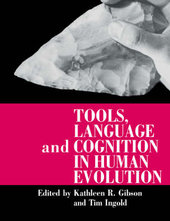
|
Tools, Language and Cognition in Human Evolution
Paperback / softback
Main Details
| Title |
Tools, Language and Cognition in Human Evolution
|
| Authors and Contributors |
By (author) Kathleen R. Gibson
|
|
By (author) Tim Ingold
|
| Physical Properties |
| Format:Paperback / softback | | Pages:496 | | Dimensions(mm): Height 248,Width 175 |
|
| Category/Genre | Animal behaviour |
|---|
| ISBN/Barcode |
9780521485418
|
| Classifications | Dewey:573.2 |
|---|
| Audience | | Professional & Vocational | |
|---|
| Illustrations |
14 Tables, unspecified; 2 Halftones, unspecified; 23 Line drawings, unspecified
|
|
Publishing Details |
| Publisher |
Cambridge University Press
|
| Imprint |
Cambridge University Press
|
| Publication Date |
27 January 1995 |
| Publication Country |
United Kingdom
|
Description
The question addressed by this volume is how human beings have evolved as creatures who can make and use more complex tools, communicate in more complex ways and engage in more complex forms of social life than any other species in the animal kingdom. Leading researchers from fields as diverse as biological and social anthropology, archaeology, linguistics, psychology, neurology and ethology have come together to present a unique interdisciplinary study of this central question in human evolution. The topics explored include the parallels between speech, manual gesture and other modes of communication; comparisons of the tool-using skills and imitative abilities of humans and non-human primates and the neurological links between the cognitive processes involved in language. This important volume will be essential reading for all those interested in human evolution, be they philosophers, humanists or scientists.
Reviews"...its subject matter is compelling, its presentation cogent, and its message important. For anyone with even a passing interest in the topic, the reward is worth the effort." Roger Lewin, New Scientist "...a handsome, mind-stretching volume that expands human understanding among practitioners, and may serve as a useful supplementary text in college and universities." Philip R. Harris, Behavioral Science "All 21 chapters in this book are well written and contain much interesting and at times challenging material." Charles Crawford, Contemporary Psychology "While most chapters are written on a level appropriate for people from other fields, the breadth of coverage insures that experts in all relevant fields will find plenty of new food for thought. Consequently, this is a rather rare book in that it can be highly recommended for readers ranging from students to experts. All that is required is an interest in tools, language and human cognition, and this will surely be provoked by the book if not already present." Thomas R. Alley, Human Ethology Bulletin
|